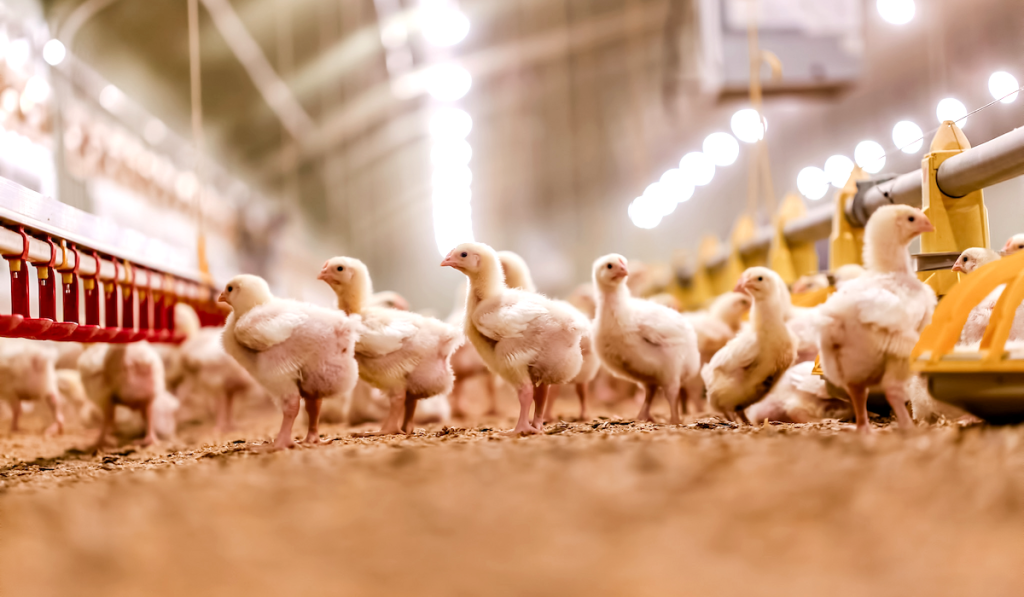In the world of livestock food production, winter threatens your animals’ well-being and profits. As the cold temperatures set in, so do risks of lower feed intake, compromised growth rates, dehydration and overall weakened immune systems. But, within livestock winter challenges lie opportunities to prepare for year-round success.
Winter preparation for livestock is more than just a seasonal routine; it’s an investment in the farm’s future success. By the end of winter, you don’t want to regret missed opportunities to prevent losses in your livestock. Whether you’re caring for poultry, swine or cattle, livestock winter management demands extra attention to nutrition, drinking water, warmth and shelter.
To help you prepare, we’ll cover both new and tried-and-true strategies for your livestock winter management. It’s more than stocking up on extra resources; it involves adjustments to your livestock drinking water, nutrition and light exposure.
Here are the practical steps you can take to protect your livestock from winter’s challenges.
Livestock Winter Woes: How to Plan For Success
Winter presents unique challenges for livestock food production facilities, requiring a strategic approach to ensure livestock biosecurity, health and productivity. Understanding and preparing for these challenges is key to navigating the colder months successfully.
Temperature Management
In the heart of winter, a well-insulated and heated barn is your livestock’s sanctuary. Optimal barn temperatures support better growth rates, enhance egg production and increase milk yield. Since animals aren’t forced to expend energy to keep warm, their energy can direct towards growth and productivity. Temperature regulation creates a comfortable environment that promotes feed consumption, reduces stress and frostbite risk—so livestock not only survive but thrive.
Humidity Control
Managing winter humidity levels within livestock facilities requires a delicate balance that’s critical for animal health and comfort. Winter’s naturally lower humidity levels can lead to dry, dusty conditions that can harm the respiratory health of livestock.
Heated barns are essential not just for warmth but also for controlling humidity and preventing diseases in livestock. Properly managed humidity levels in heated barns help prevent cold stress and conditions that either dry out or overly moisten the air. Additionally, too dry or too humid air can irritate animals’ respiratory systems and foster harmful pathogens. By strategically managing heating, insulation and ventilation, livestock food productions can prevent risks of pneumonia and other respiratory issues, ensuring a healthy winter for livestock.
Energy Costs
Keeping energy costs low is vital for livestock food production facilities, especially in winter. Livestock farms can invest in energy-efficient heating systems, like radiant floor heating or forced-air systems, and renewable energy sources, like solar panels. These proactive energy-efficient methods have an upfront cost but saves money on traditional heating costs over time.
Additionally, leveraging smart energy practices—like programmable thermostats and proper insulation—significantly reduces energy waste. These strategies not only enhance livestock comfort and health during colder months but also offer substantial cost savings. Investing in energy-efficient methods to maintain livestock welfare in winter not only saves on energy cost but also helps environmental sustainability by reducing carbon footprints.
Water Management
When winter hits and water freezes, the risk to livestock health increases. How can we plan ahead? Access to clean, unfrozen livestock drinking water is crucial during cold months. Insulated water lines and heated troughs prevent freezing, encouraging regular drinking, vital for health and growth.
Remember, ensuring water doesn’t freeze is just the start. To protect your livestock’s immune systems, invest in Hydroxyl-Based AOP water treatment (advanced oxidation process). This patented technology turns well water into clear livestock drinking water, improving taste and odor. Higher livestock water consumption aids better feed digestion and nutrient uptake, crucial for winter growth.
Additionally, AOP water treatment protects livestock drinking water from pathogens, viruses and removes heavy metals like iron, manganese and lead. It prevents scaling, fouling and biofilm, safeguarding equipment. By cutting toxic chemicals and removing heavy metals, AOP promotes safer, sustainable winter livestock water management.
Feed Management
Winter increases livestock’s nutritional needs as they burn more energy to stay warm. Livestock farmers need to adjust feed ratios accordingly, ensuring animals receive energy-rich diets. Steady access to feed ensures consistent metabolic rates in the cold.
Incorporating energy-dense feeds, such as grains and supplements, becomes crucial. These adjustments help livestock cope with the cold, supporting optimal growth and productivity. Balancing the diet with adequate fiber is also essential, promoting healthy digestion and nutrient uptake.
Consistent feed quality and availability are non-negotiable in winter feed management. Regular feeding schedules and close monitoring of intake help livestock sustain energy levels in harsh conditions. This strategic feed management forms a pillar of winter care, crucial for livestock’s well-being and farm’s success.
Ventilation
Breathing easy in winter isn’t just a human concern; it’s crucial for livestock too. Proper ventilation in barns prevents airborne illnesses. It ensures fresh air circulation, removing excess moisture and preventing respiratory issues. By installing advanced ventilation systems, farmers can eliminate harmful gas without significant heat loss, striking a balance between health and energy efficiency.
Maintaining optimal air quality in cold weather supports livestock well-being. Properly designed ventilation solutions adapt to winter conditions, safeguarding against the buildup of pathogens and pollutants. This approach keeps animals healthy and productive, even as temperatures drop, ensuring a sustainable farming environment.
Lighting
Winter’s shorter days disrupt livestock circadian rhythm, impacting their health and productivity. Supplemental lighting restores this balance, ensuring animals maintain their natural daily cycle. By artificially extending daylight hours, barn lighting supports the circadian rhythm of livestock, encouraging steady growth and consistent production throughout the colder months.
Investing in energy-efficient LED lighting mimics natural sunlight, promoting activity and health in livestock. This strategic lighting not only fosters activity and health but also enhances growth and production, all while keeping energy costs low. It’s a simple yet effective way to counteract the negative effects of limited winter daylight.
Your Winter Prep For Healthy Livestock
As the cold winter season progresses, the resilience of our livestock production is put to the test. The season’s harsh conditions necessitate strategic planning and adaptation to keep our animals healthy and productive. From water and feed management to ensuring proper shelter and warmth, every detail counts in the fight against the cold.
By addressing the seasonal challenges of freezing temperatures, reduced daylight and the need for clean, unfrozen water, we create a sustainable environment for our animals to thrive. These winter best practices are an investment in thriving livestock, setting a foundation for sustained productivity and health year-round.
Livestock health, steady growth and productivity throughout winter is a testament to livestock farmers’ dedication. As spring approaches, the efforts invested in winter care remind us of our commitment to animal welfare and the sustainability of our farming practices.








